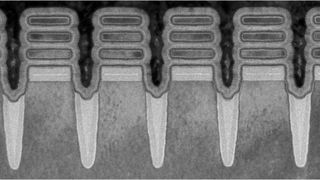IBM unveils breakthrough 2nm chip technology
The 2nm architecture promises much longer battery life for devices as well as drastic performance boosts

IBM has revealed the design for the world’s first 2nm chip in a breakthrough the firm claims will vastly improve energy efficiency and performance of various kinds of devices.
This innovation is projected to achieve 45% higher performance or 75% lower energy use than today’s most advanced 7nm variations, IBM says. Benefits will be felt across a variety of appliances, from consumer and enterprise tech to critical infrastructure systems.
IBM claims the 2nm chips can quadruple the battery life of smartphones, slash the carbon footprints of data centres, and drastically speed up a laptop’s functions. They can also contribute to faster object detection in autonomous vehicles.
“The IBM innovation reflected in this new 2 nm chip is essential to the entire semiconductor and IT industry,” said Darío Gil, SVP and director of IBM Research.

“It is the product of IBM’s approach of taking on hard tech challenges and a demonstration of how breakthroughs can result from sustained investments and a collaborative R&D ecosystem approach.”
Although IBM bowed out of the semiconductor market in 2014, its research and development division has been exploring chip innovation ever since. IBM Research maintains a good track record in the space, having previously been the first to implement the 7nm and 5nm process technologies, among other computing innovations.

The smart buyer’s guide to flash
Find out whether flash storage is right for your business
The 2nm design demonstrates the advanced scaling of semiconductors using IBM’s nanosheet technology, the company says, which was a new type of transistor developed after its 5nm chip breakthrough in 2017.
Get the ITPro. daily newsletter
Receive our latest news, industry updates, featured resources and more. Sign up today to receive our FREE report on AI cyber crime & security - newly updated for 2024.
This architecture will allow the 2nm chip to fit up to 50 billion transistors on a chip the size of a fingernail. More transistors will give designers more options to infuse core-level innovations to improve the capacity for workloads such as artificial intelligence (AI) or cloud computing.
The news is timed roughly six weeks after IBM announced a collaboration with Intel on advanced semiconductor research and development. The two tech giants will collaborate to advance next-generation logic and packaging technologies, with these efforts boosting semiconductor manufacturing.
It's unclear at this stage whether Intel's efforts fed into the development of the 2nm chip design, or whether the partnership means Intel will be among the first to reap the benefits in terms of semiconductor manufacturing.

Keumars Afifi-Sabet is a writer and editor that specialises in public sector, cyber security, and cloud computing. He first joined ITPro as a staff writer in April 2018 and eventually became its Features Editor. Although a regular contributor to other tech sites in the past, these days you will find Keumars on LiveScience, where he runs its Technology section.




